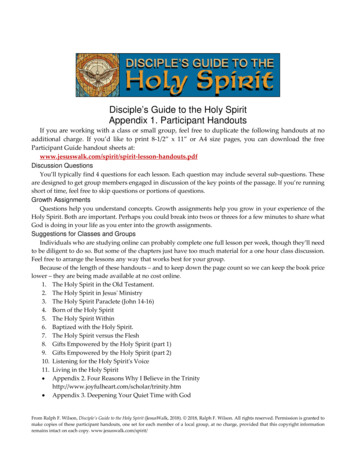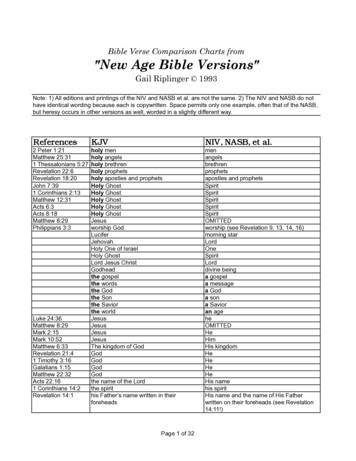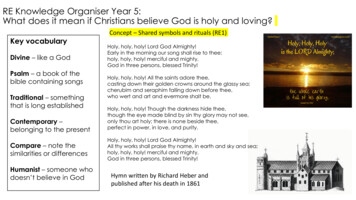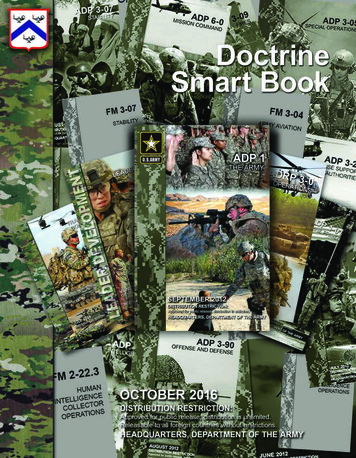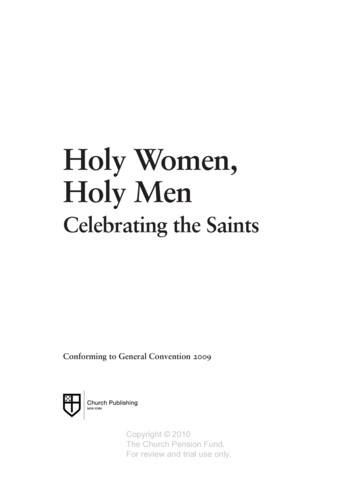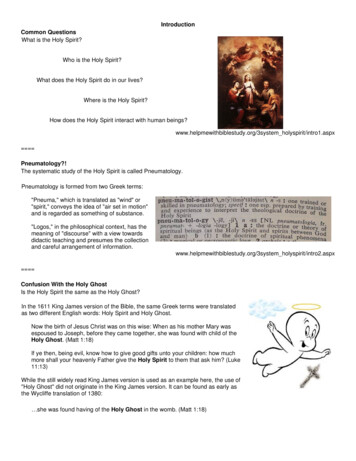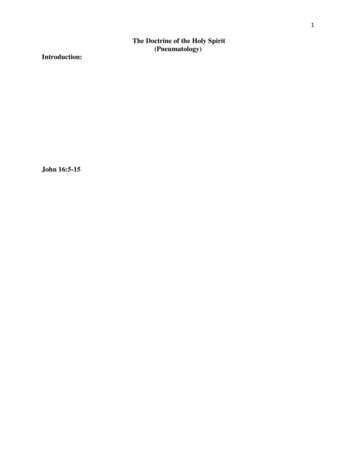
Transcription
1The Doctrine of the Holy Spirit(Pneumatology)Introduction:John 16:5-15
2Introduction Continued:In the great plan of salvation, the Holy Spirit is the “applier” of salvation. It is His work tomake actual in us God’s provision of salvation.The doctrine of the Holy Spirit has often been neglected. But on the other hand thedoctrine has often been over emphasized.Martyn Lloyd-Jones gives insight into the over emphasis on the Holy Spirit: “The Spiritdoes not glorify Himself; He glorifies the Son This is, to me, one of the most amazing andremarkable things about the biblical doctrine of the Holy Spirit. The Holy Spirit seems tohide Himself and to conceal Himself. He is always, as it were, putting the focus on the Son,and that is why I believe, and I believe profoundly, that the best test of all as to whether wehave received the Spirit is to ask ourselves, what do we think of, and what do we knowabout, the Son. Is the Son real to us? That is the work of the Spirit. He is glorifiedindirectly; He is always pointing us to the Son.And so you see how easily we go astray and become heretical if we concentrate overmuch,and in an unscriptural manner, upon the Spirit Himself. Yes, we must realize that Hedwells within us, but His work in dwelling within us is to glorify the Son, and to bring to usthat blessed knowledge of the Son and of His wondrous love to us. It is He who strengthensus with might in the inner man (Eph. 3:16), that we may know this love, this love ofChrist.” D. Martyn Lloyd-Jones, Great Doctrine of the Bible: God the Holy Spirit(Wheaton, IL: Crossway, 2003), p. 20What does the name “Holy Spirit” mean?
3The Person of the Holy SpiritThe Personality of the Holy SpiritI. His Attributes Affirm PersonalityThe Holy Spirit has intelligence: 1 Corinthians 2:10-11Isaiah 11:2 gives these mental capacities of the HS – “The Spirit of wisdom andunderstanding, the Spirit of counsel the Spirit of knowledge”The Holy Spirit has emotion:Ephesians 4:30; Isaiah 63:10 – can be grieved;Romans 15:30 – lovesR. A. Torrey wrote: “But do you ever kneel down and look up to the Holy Spirit and say toHim, ‘Holy Spirit, I thank Thee for Thy great love to me’? And yet we owe our salvationas truly to the love of the Spirit as we do to the love of the Father and the love of the Son. Ifit had not been for the love of God the Father to me, looking down upon me in my lostestate, yes, anticipating my fall and ruin and sending His own Son down to this world to dieupon the cross in my place, I would have been a lost man today. If it had not been for thelove of Jesus Christ the Son coming down to this world in obedience to the Father, andlaying down His life, a perfect atoning sacrifice on the cross of Calvary in my behalf, Iwould have been a lost man today. But if it had not been for the love of the Holy Spirit tome, leading Him to come down to this world in obedience to the Father and the Son, to seekme out in my lost condition, following me day after day, and week after week, and monthafter month, and year after year, following me when I would not listen to Him, when Ideliberately turned my back upon Him, when I insulted Him, following me into placeswhere it must have been agony for that Holy One to go, following me day after day, weekafter week, month after month, year after year, until at last He succeeded in bringing me tomy senses and bringing me to realize my utterly lost condition, and revealing the LordJesus to me as just the Savior Whom I needed and induced me and enabled me to receivethe Lord Jesus as my Savior and Lord; if it had not been for this patient, long-suffering,never-wearying love of the Spirit of God to me, I would have been a lost man today.” R. A.Torrey, The Holy Spirit Who He Is and What He Does, p. 19-20The HS has a will:1 Corinthians 12:111 Peter 1:20-21
4II. His Works Affirm PersonalityThe works of the HS are such that personality is required: The Holy Spirit teaches and reminds – John 14:26; 1 Corinthians 2:13 The Holy Spirit speaks – Acts 8:29; 13:2 The Holy Spirit makes decisions – Acts 15:28 The Holy Spirit can be grieved – Ephesians 4:30 The Holy Spirit can be outraged – Hebrews 10:29 The Holy Spirit can be lied to – Acts 5:3-4 The Holy Spirit can forbid or prevent human speech and plans – Acts 16:6-7 The Holy Spirit searches everything and comprehends God’s thoughts – 1Corinthians 2:10-11 The Holy Spirit distributes spiritual gifts – 1 Corinthians 12:11 The Holy Spirit helps us, intercedes for us, and has a mind – Romans 8:26-27 The Holy Spirit bears witness to believers about their adoption – Romans 8:16 The Holy Spirit bears witness to Christ – John 15:26 The Holy Spirit glorifies Christ, takes what is Christ’s, and declares it to believers –John 16:14 The Holy Spirit empowers – Zechariah 4:6 The Holy Spirit guides – Romans 8:14 The Holy Spirit helps/comforts – John 14:26 The Holy Spirit convicts the world of sin, righteousness, and judgment – John 16:8 The Holy Spirit restrains sin – Genesis 6:3; Isaiah 59:19; 2 Thessalonians 2:7III. Use of Personal Pronouns Affirms PersonalityIV. The Baptismal Formula in Matthew 28:19-20 Associates the Holy Spirit on an EqualBasis with the Father and the Son Whose Personality Is Generally AcceptedV. The Apostolic Benediction of 2 Corinthians 13:14 Indicates an Equality of Personalityof the Trinity
5The Deity of the Holy SpiritThe Holy Spirit is called God in Acts 5:3-4I. The Titles of the Holy Spirit Show His Deity16 titles of the Holy Spirit reveal His relationship to the other Persons of the Trinity11 titles relate the Holy Spirit to the Father: Spirit of God – Genesis 1:2; Matthew 3:16 Spirit of the Lord – Luke 4:18 Spirit of Our God – 1 Corinthians 6:11 His Spirit – Numbers 11:29 Spirit of the LORD (Yahweh) – Judges 3:10 Your Spirit – Psalm 139:7 Spirit of the Lord God – Isaiah 61:1 Spirit of your (the disciples) Father – Matthew 10:20 Spirit of the Living God – 2 Corinthians 3:3 My Spirit – Genesis 6:3 The Spirit of Him Who raised Jesus from the dead – Romans 8:115 titles relate the Holy Spirit to the Son: Spirit of Christ – Romans 8:9; 1 Peter 1:11 Spirit of Jesus Christ – Philippians 1:19 Spirit of Jesus – Acts 16:7 Spirit of His Son – Galatians 4:6 Spirit of the Lord – Acts 5:9; 8:39Titles of the Holy Spirit revealing His attributes and His Works: One Spirit – Ephesians 4:4 The Lord Who Is the Spirit – 2 Corinthians 3:18 The Eternal Spirit – Hebrews 9:14 The Spirit of Glory – 1 Peter 4:14 The Spirit of Life – Romans 8:2 The Spirit of Holiness – Romans 1:4 The Holy Spirit – Psalm 51:11; Matthew 1:20; Luke 11:13 The Holy One – 1 John 2:20 The Spirit of Wisdom and Understanding – Isaiah 11:2 The Spirit of Counsel and Might – Isaiah 11:2 The Spirit of Knowledge and the Fear of the Lord – Isaiah 11:2 The Spirit of Truth – John 14:17 The Spirit of Grace – Zechariah 12:10; Hebrews 10:29 The Spirit of Adoption – Romans 8:1
6II. His Identification and Association with GodMatthew 28:192 Corinthians 13:14In the Old Testament, what is said of God is also often said of the Spirit of God. Forinstance, the expressions “God said” and “the Spirit said” are repeatedly interchanged.Also, the activity of the Holy Spirit is sometimes said to be the activity of God. In Isaiah6:9 God speaks and says, “Go and say to this people”. Paul quotes this text in Acts 28:25and introduces it by saying, “The Holy Spirit was right in saying to your fathers throughIsaiah the prophet.”Ephesians 2:22; 1 Corinthians 6:19; Romans 8:9-10Acts 5:3-4III. The Attributes of the Holy Spirit The Holy Spirit Possesses Life – Romans 8:2 The Holy Spirit Is Omnipresent – Psalm 139:7 The Holy Spirit Is Omniscient – 1 Corinthians 2:10-11 His Title Holy Spirit Refers to His Holiness The Holy Spirit Is Eternal – Hebrews 9:14IV. The Works of the Holy SpiritAll the works of the Holy Spirit bear the marks of His deity: Creation – Genesis 1:2; Job 33:4 Regeneration – Titus 3:5; John 3:5-6 Sanctification – 2 Thessalonians 2:13 Inspiration – 2 Peter 1:21 Resurrection – Romans 8:11V. The Subordination of the Holy Spirit
7The Holy Spirit in CreationI. Proof of the Work of the Holy Spirit in CreationSpecific Scriptures:Genesis 1:2Psalm 33:6Psalm 104:30Job 26:13Job 33:4Isaiah 40:12-14Use of ElohimII. The Nature of the Creative WorkCreated with OrderThe creation with beauty and arrangement
8The creation of lifeThe work of the Holy Spirit in creation is to bring Glory to GodThe End Result of the Holy Spirit’s Work in the Old Testament:God “hides” His face due to our sin. But the Holy Spirit “unveils” God’s facePsalm 104:29-30Psalm 51:9-12Ezekiel 39:29The Work of the Holy Spirit in the Direct Revelation of GodBehind the messages of the Old Testament prophets was the unseen work of the Holy Spiritin imparting the mind of God to His prophets. Direct statements of Scripture – 2 Peter 1:21; 2 Samuel 23:2; Ezekiel 2:2; 11:1-2,24; Micah 3:8Indirect Statements – “”Thus says the Lord”In the New Testament God continues to reveal Himself through the Holy Spirit. However,in a few respects there are new developments in the doctrine of revelation Revelation through Christ – in the New Testament the Messiah of the OldTestament is incarnate and constituted a revelation of God in His person andministry. The Messiah ministered in the power of the Holy SpiritRevelation in the Believer – Beginning at Pentecost the Holy Spirit indwells everybeliever. He guides, teaches and helps believer on a scale not found in the OldTestament.Revelation through the Written Word
9The Holy Spirit’s and the Inspiration of ScriptureI. The Importance of InspirationII. The Meaning of Inspiration“theopneustos” 2 Greek words “God breathed”III. Inspiration a Work of the Holy Spirit2 Peter 1:20-21The Testimony of the Old Testament WritersDavid – 2 Samuel 23:2-3Isaiah – Isaiah 59:21Jeremiah – Jeremiah 1:9Terminology of the Prophets“Thus says the Lord” or its equivalent, is found hundreds of times in the BibleThe Testimony of ChristIn quoting from the Old Testament, Christ is explicit in assigning the work of inspiration tothe Holy Spirit.Matthew 22:42-43; Mark 12:36 (in quoting Psalm 110:1 which is written by David, Christaffirms that David wrote by the inspiration of the Holy Spirit.The Testimony of the ApostlesPeter – Acts 1:16 (Psalm 41:9)Acts 4:24-26 (Psalm 2)Paul – Acts 28:25 (Isaiah 6:9-10)Author of Hebrews – Hebrews 3:7 (Psalm 95:7-11); 10:15-16 (Jeremiah 31:33)
10IV. Inspiration in the New TestamentThe inspiration of the New Testament, like that of the Old, is supernatural, extends to thevery words of Scripture without destroying the human element and without losinginfallible accuracy. The writing of the New Testament has the same authority, divineorigin, and infallibility as the Scriptures of the Old Testament. Each book of the NewTestament has its own supporting evidence testifying to its inspiration.The New Testament Authenticated by ChristBefore Christ left His disciples, He promised them the ministry of the Holy Spirit Whowould guide them in the truth and reveal new truth to them – John 16:12-15.The Inspiration of the New Testament Claimed by the Apostles1 Corinthians 2:131 Corinthians 14:37Galatians 1:6-91 Thessalonians 4:2, 152 Thessalonians 3:6Peter, while declaring his own inability to understand all that Paul had written, declares allPaul’s epistles to be a part of the Scriptures – 2 Peter 3:15-16Conclusion:It has been estimated that the Bible in various ways asserts its own inspiration some threethousand times.
11The Holy Spirit in Relation to ChristThe Holy Spirit was with the disciples through the ministry of Jesus. They saw what theHoly Spirit is like and what He does, etc. – John 14:16-17The ministry of the Holy Spirit in relation to Jesus was prophesied in the Old Testament:Isaiah 11:2-3a; 42:1; 61:1-2aI. The Holy Spirit in the Virgin BirthThe Holy Spirit Was the Agent of ConceptionMatthew 1:18-21Luke 1:34-35Hinted at in Genesis 3:15II. The Holy Spirit in the Life of ChristJesus was filled with the Holy Spirit from the moment of conceptionIII. The Holy Spirit in Relation to the Baptism of ChristBaptism was not the beginning of the Holy Spirit’s ministry to Christ but marked a newphase of the ministry of the Holy SpiritMade possible a renewed declaration of the unity of the TrinityIV. The Holy Spirit in Relation to the Messiahship of JesusJesus was anointed of the Holy Spirit to preachJesus did miracles (including casting out demons) by the power of the Holy Spirit – Luke4:14-15, 18
12V. The Holy Spirit in Relation to the Sufferings of ChristThe Relation of the Holy Spirit to the sufferings of Jesus in Life In His Temptation John Owen: By Him He was directed, strengthened, and comforted in His wholecourse, in all His temptations, troubles, and sufferings from first to last; for therewas a confluence of them upon Him in His whole way and work; a great part of Hishumiliation for our sakes consisting in these things. This God promised to Him, andthis He expected.” The relation of the Holy Spirit to the sufferings of Christ in deathThe work of the Holy Spirit in relation to the sufferings of Christ consisted in:1. Sustaining His human nature2. Encouraging Him in submission to the Will of God and obedience to Hiscommands3. Encouraging and strengthening Christ in the path of duty which led to thecrossVI. The Holy Spirit in Relation to the Resurrection and Glorification of ChristThe Trinity in relation to the resurrection of ChristActs 2:24Jesus revealed His own power in resurrection – John 10:17-18Ephesians 1:17-20The Holy Spirit in relation to the resurrection of ChristRomans 1:3-4The Holy Spirit in relation to the ascension of Christ to the Father’s right handActs 1:8-9
13The Work of the Holy Spirit in SalvationThe Holy Spirit is involved in preparing our heart to receive salvation (even though ourheart is in rebellion against God) – John 16:7-11The Holy Spirit: Convicts/convinces the world of sin Makes known the righteousness of God Makes known the relation of the cross to judgment and SatanThe Holy Spirit restrains sinGenesis 6:3Nehemiah 9:30Isaiah 63:10-112 Thessalonians 2:7
14RegenerationJohn 1:13John 3:1-7Romans 6:13Ephesians 2:1-5Ephesians 2:10Ephesians 4:24Titus 3:5The Effects of Regeneration: A New A New Experience Eternal Security
15The Baptism of the Holy SpiritActs 1:4-5Because of the maze of conflicting opinions on the baptism with the Holy Spirit, we mustremain close to the Scriptures, particularly avoiding assumptions which the Scriptures donot warrant. The Bible presents the doctrine in sufficient passages to permit the carefulstudent to arrive at an accurate understanding of the truth. In all, there are eleven specificreferences to spiritual baptism in the New Testament.Matthew 3:11; Mark 1:8; Luke 3:16; John 1:33; Acts 1:5; 11:16; Romans 6:1-4; 1Corinthians 12:13; Galatians 3:27; Ephesians 4:5; Colossians 2:12The major passage which may be taken as the basis of interpretation of the other passages,is 1 Corinthians 12:13The word “baptize” is not an English word. We use it because we find it in our Englishtranslations of the Bible. It is a Greek word that has been transliterated, that is, it has beenbrought over from the Greek into the English without being translated at all.Definition of baptism by Kenneth Wuest: “It means to introduce or place a person or athing into a new environment, or into union with something else so as to alter its conditionor its relationship to its previous environment.”I. Baptism with the Holy Spirit Is Universal Among ChristiansAll Christians have this baptism – 1 Corinthians 12:13; Ephesians 4:5
16The baptism with the Holy Spirit is a past event in the believers life – 1 Corinthians 12:13There is no exhortation in Scripture to be baptized with the Holy Spirit.Never in Scripture is baptism with the Holy Spirit recorded as occurring after salvationafter its initial occurrence on the Day of PentecostII. Baptism into the Body of ChristOne of the important results of the baptism with the Holy Spirit is the union of believers inthe body of Christ.Every believer is given a distinct place in the body of Christ – Ephesians 4:15-16III. Baptism into ChristJohn 14:19-20Romans 6:1-4IV. Baptism with the Holy Spirit Occurs Only in This Present DispensationActs 1:5The work with the baptism of the Holy Spirit is accomplished once and for all in thebeliever and is never repeated. It is never improved.V. The Baptism with FireIn Matthew 3:11; and Luke 3:16 a statement is made that Jesus would baptize with theHoly Spirit and with fire.The context of the passage points to judgment at the 2nd coming of Christ and theestablishment of the kingdom. The church age is introduced with a baptism of the Spirit.The kingdom age will be introduced with a baptism of fire.
17The Indwelling of the Holy SpiritI. Indwelling of the Holy Spirit Universal Among ChristiansThe fact of the indwelling of the Holy Spirit is mentioned in many passages:John7:37-39; Acts 11:17; Romans 5:5; 8:9, 11; 1 Corinthians 2:12; 6:19-20; 2 Corinthians5:5; Galatians 3:2; 4:6; 1 John 3:24; 4:13The absence of the Holy Spirit is proof of unsaved condition – Romans 8:9; Jude 18-19Sinning Christians possess the indwelling SpiritThe Holy Spirit is a giftJohn 7:37-39; Acts 11:17; Romans 5:5; 1 Corinthians 2:12; 2 Corinthians 5:5II. Difficult Passages:Passages dispensationally misapplied1 Samuel 16:14Psalm 51:11Luke 11:13Passages sometimes interpreted to mean that the indwelling of the Spirit is an experiencesubsequent to the new birth and therefore is not experienced by every believerActs 5:32Acts 8:14-20Acts 19:1-6
18III. The Distinct Character of Indwelling of the Holy SpiritIV. The Importance of the Indwelling of the Holy SpiritThe presence of the Holy Spirit is our “down payment/earnest” of the blessing ahead – 2Corinthians 1:22; 5:5; Ephesians 1:14.The presence of the Holy Spirit makes the body of the believer a temple of God – 1Corinthians 6:19
19The Sealing of the Holy SpiritI. The Holy Spirit Is the SealThe seal signifies 4 primary things: Security – Authenticity Ownership AuthorityThree passages of Scripture reveal the sealing of the Holy Spirit:2 Corinthians 1:21-22Ephesians 1:13Ephesians 4:30II. Sealing of the Holy Spirit Is Universal Among ChristiansSome have taught that the sealing comes after salvation and is therefore something to besought after.The three passages cited above demonstrate that every Christian is sealed by the HolySpirit at the time of salvation.A big cause of the misunderstanding is because of the poor way that the KJV translatesEphesians 1:13 (“After that ye believed, ye were sealed with that Holy Spirit of promise”.)Most other translations do a better job:NAS “ having also believed, you were sealed in Him with the Holy Spirit of promise”ESV “ .you also, when you heard the word of truth, the gospel of your salvation, andbelieved in Him, were sealed with the promised Holy Spirit”NIV “ .having believed, you were marked in Him with a seal, the promised Holy Spirit”
20III. The Sealing of the Spirit Is Not an ExperienceIV. The Significance of the Sealing of the Holy Spirit
21The Filling of the Holy SpiritDefinition of the Filling of the Holy SpiritTo be filled with the Holy Spirit means to be totally controlled by Him.There are 14 references to the filling of the Holy Spirit in the New TestamentThe first two references in the New Testament occurred before the cross. They follow theOld Testament pattern and were limited to certain individuals rather than being auniversal privilege extended to all believers:Luke 1:15 angel told Zecharias that John the Baptist would be filled with the Spirit fromhis mother’s wombLuke 1:41 & 67 the parents of John the Baptist are filled with the SpiritLuke 4:1 – Jesus was “full of the Holy Spirit” at His baptism and afterwardsActs 2:4 – On the Day of Pentecost the 120 believers in the Upper Room were filled with theSpiritActs 4:8 – Peter was filled with the Spirit when he spoke to the SanhedrinActs 4:31 – The early Christians were filled with the Spirit after they prayedActs 6:3 – An essential quality sought in the selection of the first deacons was that theyshould be “full of the Spirit”Acts 7:55 – Stephen was full of the Spirit as he looked to the heavens to see the glory of Godbefore his martyrdomActs 9:17 – Paul upon receiving the Lord’s messenger (Ananias), was filled with the HolySpiritActs 11:24 – Barnabas is described as “full of the Holy Spirit”Acts 13:9 – Paul was filled with the Spirit while ministering on CyprusActs 13:52 – All the disciples at Antioch in Pisidia were “filled with joy and with the HolySpirit”Ephesians 5:18 – believers are commanded to be filled with the Holy SpiritThe thought is not that individuals have received more of the Holy Spirit, but it is ratherthat the Spirit has complete possession of the individual.
22The Command to Be Filled with the Holy Spirit – Ephesians 5:18“drunk with wine” a contrast is being offered between being drunk & being filled w HSJohn R. W. Stott: “We can indeed agree that in both drunkenness and the fullness of theSpirit two strong influences are at work within us, alcohol in the bloodstream and the HolySpirit in our hearts. But, whereas excessive alcohol leads to unrestrained and irrationallicense, transforming the drunkard into an animal, the fullness of the Spirit leads torestrained and rational moral behavior, transforming the Christian into the image ofChrist. Thus, the results of being under the influence of spirits on the one hand and of theHoly Spirit of God on the other are totally and utterly different. One makes us like beasts,the other like Christ.”Observations on the filling of the Holy Spirit derived from the grammar of the command:The tense of the verb in Ephesians 5:18 is present imperative (in contrast to the baptism ofthe HS which takes place once and for all)The verb “be filled” is in the plural. Paul is saying this to all of usThe verb is in the passive voice. Not “fill yourself up with the Spirit” but “be being filled.”But we can’t take this too far. Just as a person gets drunk by drinking alcohol, so anindividual is filled w the Holy Spirit by involving himself or herself in the process that leadsto it. For example, I can’t be filled with the Holy Spirit while I have known andunconfessed sin. I can’t be filled w the Holy Spirit while I am walking contrary to God’swill.Being filled with the Holy Spirit has the same results as letting the Word of Christ dwell inyou richly – Colossians 3:16. Where you have one you will have the other.Conditions for the Filling of the Holy Spirit3 Conditions are specified in Scripture for the filling of the Holy Spirit:1. “Do Not Quench the Spirit” – 1 Thessalonians 5:192. “Do Not Grieve the Holy Spirit of God” – Ephesians 4:303. “Walk By the Spirit” – Galatians 5:16
23Results of the Filling of the Holy Spirit1. Progressive Sanctification2. Teaching Ministry of the Holy Spirit3. Guidance4. Assurance of Salvation5. Worship6. Effective Prayer7. ServiceWhat Is a Spirit-Filled Person Like?Ephesians 5:18-25Galatians 5:16Galatians 5:22-23Conclusion:We need to be filled with the Holy Spirit in order to be what God wants us to be and to livethe Christian life the way it was meant to be lived.“To be filled with the Spirit does not mean a state of high excitement or of absoluteperfection, or a state in which there will be no growth. No. Being filled with the Spirit issimply this – having my whole nature yielded to His power. When the whole soul is yieldedto the Holy Spirit, God Himself will fill it.” Andrew Murray
24Spiritual GiftsIt is helpful to distinguish between the spiritually gifted men who are given to the churchand the gifts when are given to individual believers.The gifted men are listed in Ephesians 4:7-14 Apostles Prophets Evangelists Pastors (Shepherds) TeachersThe chief passage of spiritual gifts is 1 Corinthians 12-14Spiritual Gifts Are Sovereignly Bestowed – 1 Corinthians 12:11Every Christian Has Spiritual Gifts – 1 Corinthians 12:4-7; 1 Peter 4:10
25Spiritual Gifts Are Given to Serve OthersSpiritual Gifts Are Given by God So That His Glory Might Be Displayed – 1 Peter 4:10-11Some Gifts Are More Effective and Essential than OthersSpiritual Gifts Are to Be Used in Love – 1 Corinthians 13Spiritual Gifts Are Not the Same as Natural Gifts and TalentsSome Gifts Were TemporaryPermanent Spiritual Gifts1. The Gift of Teaching – Romans 12:7; 1 Corinthians 12:28; Ephesians 4:112. The Gift of Serving – Romans 12:7; 1 Corinthians 12:283. The Gift of Leadership/Administration – Romans 12:8; 1 Corinthians 12:284. The Gift of Exhortation – Romans 12:8
265. The Gift of Giving – Romans 12:86. The Gift of Showing Mercy – Romans 12:87. The Gift of Faith – 1 Corinthians 12:8-108. The Gift of Helps – 1 Corinthians 12:28How Can We Discover Our Spiritual Gift? Make sure you are a Christian Make sure you are not “grieving the Holy Spirit” (Ephesians 4:30). Since it is theHoly Spirit Who makes known His gift to us and then works through that gift, it isquite obvious that sin will hinder us from discovering our spiritual gift. Concentrate on others. The purpose of our spiritual gift is to serve the Body ofChrist. If we are not involved in the life of the body, there will be no basis orpurpose for discovering what our spiritual gift is. The more we concentrate on theneeds of those around us, the more the Holy Spirit will be free to work through ourspiritual gift to meet those needs. Take note of what you find joy in. Ask mature Christians what gifts they see operating in your life
27Temporary Sign GiftsThe View that the Temporary Sign Gifts Continue Today:The case for continuation rests on four basic considerations (taken from The Holy Spirit bySinclair Ferguson, p. 223):1. The “fact” of contemporary experience.2. The New Testament nowhere states that any of the gifts of the Spirit would bewithdrawn; therefore they continue.3. The cessationist view would imply that there are two distinct, or at least distinguishable,dispensations in the new age which Jesus inaugurated through His death, resurrection andthe gift of the Spirit, namely the apostolic age and the post-apostolic age. But the NewTestament knows only one age, namely the age inaugurated by the eschatological Spirit. Itmay therefore be assumed that these gifts were intended for the church throughout the newage and are characteristic of it.4. In recognizing that prophecy will eventually cease, Paul indicates that this will takeplace only when “perfection comes” (1 Corinthians 13:10). Then the imperfect willdisappear. In view here is the end of time. Implied, therefore, is the view that prophecy(and presumably other gifts) will continue until the return of Christ.The Cessationist View:A recent book presenting the Cessationist View is Strange Fire by John MacArthurIn the Bible miracles and supernatural signs from God appear to be limited to a few briefperiods in biblical history in which they serve as confirmatory signs of a new revelation andits proclaimers.God continued to work powerfully at other times (and often in remarkable ways) but themiracles weren’t the norm except in a few brief periods. The period of the Exodus The time of Elijah and Elisha which ushered in the era of the prophetic ministry The ministry of Christ The ministry of the apostles – 2 Corinthians 12:12); Hebrews 2:3-4With the completion of the New Testament, the need for further unusual display ofmiraculous works ceased.Sign gifts were given to believers fully functional and ready for immediate use. No one hadto learn how to speak in tongues, or how to interpret tongues, or how to heal, or how towork a miracle.
28When considering this subject we need to take as our model the Bereans who were said tobe “more noble” because they examined the Scriptures daily to ascertain whether Paul’steaching was true. They didn’t search their own experiences or the experiences of others,but searched the Scriptures, which were considered to be sufficient for determining truth.The Gift of ProphecyThe gift of prophecy was evidently possessed by many during the apostolic age: Agabus – Acts 11:27-28; 21:10-11 Barnabas, Simeon, Lucius, Manaen, and Paul are mentioned among the “prophetsand teachers” at Antioch – Acts 13:1 The four daughters of Philip – Acts 21:9 Judas and Silas – Acts 15:32 Probably all the apostles possessed the gift of prophecyCharacteristics of the New Testament Prophet Spoke for God Warned of judgment on sin Delivered their message as from God Dealt with contemporary events as well as predicted events of the future They revealed the will of God which otherwise might have been unknown, meetingthe need which later was to be filled by the written New Testament Delivered their message with the authority of God Their message was free from error, a product not of their own mind but a revelationfrom God
291 Corinthians 14:29-40Paul gives principles for prophets to follow:1. Only two or three prophets were to speak at any given service - 29a2. The other prophets were to judge what was said – 29b3. If someone else had a revelation, the first speaker was to yield to him – 304. Each prophet was to speak in turn – 315. Each prophet is to have control of his own spirit – 32-33aPaul gives other general regulations – 33b-40
30Summary of the Biblical Characteristics of the Gift of Prophecy: True Prophecy is always verbal, the very words of God. It is never an impulse or animpression. It’s never a feeling that needs interpretation. True Prophecy is propositional – it is testable as either true or false – Deuteronomy13:1-5; 18:20-22 True Prophecy is infallible and inerrant Because true prophecy is verbal, propositional, and inerrant, the only conclusion todraw is that it carries the full weight of divine autho
The Holy Spirit can forbid or prevent human speech and plans - Acts 16:6-7 The Holy Spirit searches everything and comprehends God's thoughts - 1 Corinthians 2:10-11 The Holy Spirit distributes spiritual gifts - 1 Corinthians 12:11 The Holy Spirit helps us, intercedes for us, and has a mind - Romans 8:26-27



